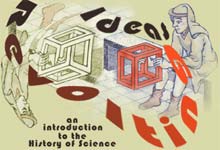
University of California, Irvine
Instructor: Dr. Barbara J. Becker

|
Quodlibet 8. Revolting idea...? |
When on board H.M.S. 'Beagle,' as a naturalist, I
was much struck with certain facts in the distribution of the inhabitants of South
America, and in the geological relations of the present to the past inhabitants
of that continent. These facts seemed to me to throw some light on
the origin of species -- that mystery of mysteries, as it has been called
by one of our greatest philosophers [John Frederick William Herschel (1792-1871)].
On my return home, it occurred to me, in 1837, that something might
perhaps be made out on this question by patiently accumulating and reflecting
on all sorts of facts which could possibly have any bearing on it.
--Charles Darwin, Introduction to On the Origin of Species (1859). |
| In 1859, Charles Darwin published On the Origin of Species triggering
what some historians of science have described as a scientific revolution.
Darwin asked questions deemed appropriate for scientists to ask and tried to answer them using methods that scientists of his day accepted as valid. Even Thomas Kuhn would have to agree that he was a true "normal" scientist working on "normal" puzzles using "normal" methods. And Darwin certainly was not the first to suggest that present day animals have evolved from earlier forms. |
| So what is the "revolution" here? How do Darwin and On the Origin of Species fit into Kuhn's structure of scientific revolutions? |
|